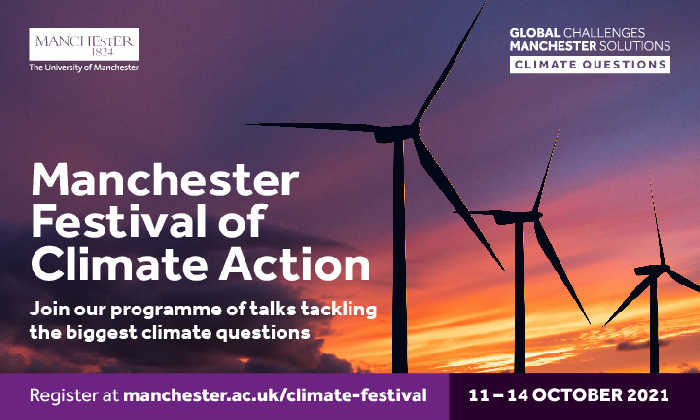Manchester Festival of Climate Action
By Kerry Mack

No matter what your degree or intended career path is, you can use your skills to contribute to solving the climate crisis. This is the big takeaway from the Manchester Festival of Climate Action series of talks, which is running from 11th-14th of October.
The 27 talks cover a wide range of approaches – everything from science and technology to accounting to the arts – and will address local, national and global challenges. Each day has a theme based around the four goals of the 26th UN Climate Change Conference of the Parties (COP26) – mitigation, adaptation, finance and collaboration. COP26 takes place between 1st-12th November 2021 in Glasgow and nine Manchester academics will be attending the negotiations, some of whom will also be panelists during the festival.

Here is an overview of the theme of each day and a quick preview of some of the sessions.
Monday: Mitigation
A discussion of efforts toward achieving global net-zero carbon emissions including carbon capture and storage, utilisation of nuclear energy and green infrastructure in cities.
Can we save the world one plastic fork at a time?
Professor Michael Shaver, Zoe Schyns and Dr Ahu Gumrah Parry – of the Sustainable Materials Innovation Hub and the Department of Materials here at UoM – consider the double edged sword of our dependence on plastic and the issue of plastic waste and showcase the solutions they are working on.
Super-low carbon live music: how can the UK live music sector play its part in tackling the climate crisis?
UoM Professor of Climate Energy and Policy and Director of the Tyndall Centre for Climate Change Research Carly McLachlan outlines the Roadmap to Super Low Carbon Live Music which was developed in conjunction with the band Massive Attack. Measures recommended by the plan include artists swapping jets for trains and public transport being included in gig tickets.
Tuesday: Adaptation
This topic considers the action needed to protect habitats and communities from the effects of climate change such as extreme weather. Issues covered include the impact of a changing climate on human health, social change as a vehicle for transitioning to a post-carbon world and sustainable food systems.
Nature recovery, collaboration and creativity: lessons from Greater Manchester’s post-industrial landscape
Dr Joanne Tippett – Lecturer in Spatial Planning in the School of Environment and Development at UoM – hosts this talk on the restoration of connected ecosystems across the post-industrial landscape of Manchester, as envisioned by academics, students, artists and communities. This is key for flood prevention, urban cooling, biodiversity protection and more.
‘Net zero’ teaching and learning
Dr Jennifer O’Brien – Academic Lead of Sustainability Teaching and Learning at UoM – leads this workshop about how the sustainability message can be delivered more effectively at university in order to engage all students.
Wednesday: Finance
The goal of net-zero can only be reached with sufficient financial backing from both the private and public sectors. Topics covered include the impact of green investment on businesses and what an effective green recovery should look like for the UK.
How can accounting save the world?
Professor Paolo Quattrone – Professor of Accounting, Governance and Society, and Director of Centre for the Analysis of Investment Risk (CAIR) at Alliance Manchester Business School – discusses the introduction of environmental impact as a bottom-line consideration for businesses. He will consider how ‘value-added accounting’ could lead to corporate sustainability and the restoration of ‘natural capital’.
How do you teach accounting to generation Greta?
Jennifer Rose from Alliance Manchester Business School explores how the risks to the global economy posed by the climate crisis can be taught to accounting students in order for them to make a positive impact in their future business careers.
Thursday: Collaboration
How can we work across sectors and cultures and countries to adapt to a changing environment and empower climate action? Topics to be discussed include energy poverty and the role of culture, communities and diversity in addressing the climate emergency.
Turning fusion from a dream to a reality
Nuclear fusion – if realised – will be a continuous source of zero carbon-emitting power with negligible harmful waste products. An extensive panel of fusion researchers – including Dr Aneeqa Khan of UoM’s Dalton Nuclear Institute – will examine the next steps in making fusion power a reality. The talk will also cover how international collaboration will be required to fully realise its potential.
Virtual Climate Gallery: how do the arts enable conversations around climate change?
An online exhibition that explores art as a medium for promoting engagement in climate change dialogue and action. Exhibitors include Call of the Wild – a music project incorporating natural sounds recorded in Colombia to raise awareness of biodiversity conservation – and Amrita’s Journey – a graphic novel that investigates how the humanitarian aid system might need to adapt due to the climate emergency.
All of the talks are free to attend, will be held online and are open to all. To find out more please go to https://www.manchester.ac.uk/climate-festival/







